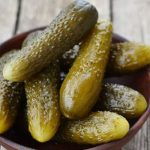 A gherkin is a small cucumber pickled in vinegar. The name of this condiment appeared in English in the mid seventeenth century as a respelling of the Dutch name of the pickle, gurkkijn. In turn, gurkkijn was invented as a diminutive of the Dutch gurk, meaning cucumber, which evolved through Polish from the Medieval Greek name of the pickle, angourion. Even further back, it is possible that angourion arose from the Greek agouros, meaning youth, since gherkins are made from unripe—and therefore “young”—cucumbers. Gherkins are also sometimes known by their French name, cornichon, meaning little horn, a word that derives, like cornucopia, from the Latin cornu, meaning horn.
A gherkin is a small cucumber pickled in vinegar. The name of this condiment appeared in English in the mid seventeenth century as a respelling of the Dutch name of the pickle, gurkkijn. In turn, gurkkijn was invented as a diminutive of the Dutch gurk, meaning cucumber, which evolved through Polish from the Medieval Greek name of the pickle, angourion. Even further back, it is possible that angourion arose from the Greek agouros, meaning youth, since gherkins are made from unripe—and therefore “young”—cucumbers. Gherkins are also sometimes known by their French name, cornichon, meaning little horn, a word that derives, like cornucopia, from the Latin cornu, meaning horn.
The diminutive and pliant knobby fruit, belonging to a variety of cucumbers indigenous to the West Indies, but now cultivated in other regions, is utilized in a similar manner as cucumbers, namely, by pickling. Occasionally, unripe garden cucumbers are also referred to as gherkins.
Gherkins are the pickled fruit of a particular variety of cucumber. The finest gherkins are small and possess a dark green hue, featuring a rough exterior. France and Holland export significant quantities of these delectable treats, which are commonly sold in jars filled with brine.
